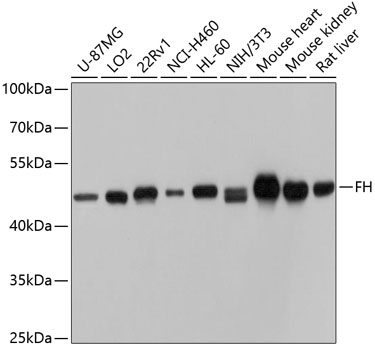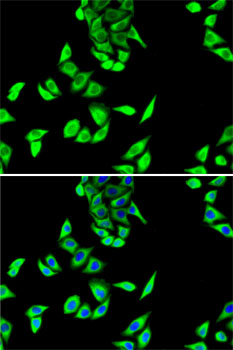Epigenetics & Nuclear Signaling Antibodies 2
Anti-FH Antibody (CAB5688)
- SKU:
- CAB5688
- Product Type:
- Antibody
- Reactivity:
- Human
- Reactivity:
- Mouse
- Reactivity:
- Rat
- Host Species:
- Rabbit
- Isotype:
- IgG
- Antibody Type:
- Polyclonal Antibody
- Research Area:
- Epigenetics and Nuclear Signaling
Description
| Antibody Name: | Anti-FH Antibody |
| Antibody SKU: | CAB5688 |
| Antibody Size: | 20uL, 50uL, 100uL |
| Application: | WB IHC IF |
| Reactivity: | Human, Mouse, Rat |
| Host Species: | Rabbit |
| Immunogen: | Recombinant fusion protein containing a sequence corresponding to amino acids 1-280 of human FH (NP_000134.2). |
| Application: | WB IHC IF |
| Recommended Dilution: | WB 1:500 - 1:2000 IHC 1:50 - 1:200 IF 1:50 - 1:100 |
| Reactivity: | Human, Mouse, Rat |
| Positive Samples: | U-87MG, LO2, 22Rv1, NCI-H460, HL-60, NIH/3T3, Mouse heart, Mouse kidney, Rat liver |
| Immunogen: | Recombinant fusion protein containing a sequence corresponding to amino acids 1-280 of human FH (NP_000134.2). |
| Purification Method: | Affinity purification |
| Storage Buffer: | Store at -20'C. Avoid freeze / thaw cycles. Buffer: PBS with 0.02% sodium azide, 50% glycerol, pH7.3. |
| Isotype: | IgG |
| Sequence: | MYRA LRLL ARSR PLVR APAA ALAS APGL GGAA VPSF WPPN AARM ASQN SFRI EYDT FGEL KVPN DKYY GAQT VRST MNFK IGGV TERM PTPV IKAF GILK RAAA EVNQ DYGL DPKI ANAI MKAA DEVA EGKL NDHF PLVV WQTG SGTQ TNMN VNEV ISNR AIEM LGGE LGSK IPVH PNDH VNKS QSSN DTFP TAMH IAAA IEVH EVLL PGLQ KLHD ALDA KSKE FAQI IKIG RTHT QDAV PLTL GQEF SGYV QQVK YAMT RIKA AMPR IYEL AAGG TAVG |
| Gene ID: | 2271 |
| Uniprot: | P07954 |
| Cellular Location: | Cytoplasm, Mitochondrion |
| Calculated MW: | 50kDa/54kDa |
| Observed MW: | 50kDa |
| Synonyms: | FH, FMRD, HLRCC, LRCC, MCL, MCUL1 |
| Background: | The protein encoded by this gene is an enzymatic component of the tricarboxylic acid (TCA) cycle, or Krebs cycle, and catalyzes the formation of L-malate from fumarate. It exists in both a cytosolic form and an N-terminal extended form, differing only in the translation start site used. The N-terminal extended form is targeted to the mitochondrion, where the removal of the extension generates the same form as in the cytoplasm. It is similar to some thermostable class II fumarases and functions as a homotetramer. Mutations in this gene can cause fumarase deficiency and lead to progressive encephalopathy. |
| UniProt Protein Function: | FH: a metabolic enzyme that participates in the tricarboxylic acid cycle that catalyzes the conversion of (S)-malate into fumarate + H2O. There are two substrate binding sites: the catalytic A site, and the non-catalytic B site that may play a role in the transfer of substrate or product between the active site and the solvent. Alternatively, the B site may bind allosteric effectors. Fumarate accumulates in the cell when FH is inactivated. Fumarate inhibits the dioxygenases that hydroxylate the transcription factor HIF and leads to its degradation by VHL. Since HIF turns on oncogenic pathways, FH has apparent tumor suppressor activity. Defects in FH are the cause of hereditary leiomyomatosis and renal cell cancer (HLRCC), a highly metastatic form of RCC. Defects in FH are the cause of fumarase deficiency (FD) also known as fumaricaciduria. FD is characterized by progressive encephalopathy, developmental delay, hypotonia, cerebral atrophy and lactic and pyruvic acidemia. Cells derived from a patient with HLRCC exhibit compromised oxidative phosphorylation, dependence on anaerobic glycolysis, rapid glycolytic flux, and overexpression of lactate dehydrogenase A (LDHA) and GLUT1. Two human isoforms are produced by alternative initiation. The longer isoform is mitochondrial, while the shorter form, missing residues 1-43, is cytoplasmic. |
| UniProt Protein Details: | Protein type:Tumor suppressor; Mitochondrial; Carbohydrate Metabolism - citrate (TCA) cycle; Lyase; EC 4.2.1.2 Chromosomal Location of Human Ortholog: 1q42.1 Cellular Component: cytoplasm; cytosol; mitochondrial matrix; mitochondrion; tricarboxylic acid cycle enzyme complex Molecular Function:fumarate hydratase activity; protein binding Biological Process: cellular metabolic process; fumarate metabolic process; homeostasis of number of cells within a tissue; malate metabolic process; protein tetramerization; tricarboxylic acid cycle Disease: Fumarase Deficiency |
| NCBI Summary: | The protein encoded by this gene is an enzymatic component of the tricarboxylic acid (TCA) cycle, or Krebs cycle, and catalyzes the formation of L-malate from fumarate. It exists in both a cytosolic form and an N-terminal extended form, differing only in the translation start site used. The N-terminal extended form is targeted to the mitochondrion, where the removal of the extension generates the same form as in the cytoplasm. It is similar to some thermostable class II fumarases and functions as a homotetramer. Mutations in this gene can cause fumarase deficiency and lead to progressive encephalopathy. [provided by RefSeq, Jul 2008] |
| UniProt Code: | P07954 |
| NCBI GenInfo Identifier: | 1730117 |
| NCBI Gene ID: | 2271 |
| NCBI Accession: | P07954.3 |
| UniProt Secondary Accession: | P07954,B1ANK7, |
| UniProt Related Accession: | P07954 |
| Molecular Weight: | 50,213 Da |
| NCBI Full Name: | Fumarate hydratase, mitochondrial |
| NCBI Synonym Full Names: | fumarate hydratase |
| NCBI Official Symbol: | FH |
| NCBI Official Synonym Symbols: | MCL; FMRD; LRCC; HLRCC; MCUL1 |
| NCBI Protein Information: | fumarate hydratase, mitochondrial |
| UniProt Protein Name: | Fumarate hydratase, mitochondrial |
| UniProt Gene Name: | FH |
| UniProt Entry Name: | FUMH_HUMAN |
View AllClose








